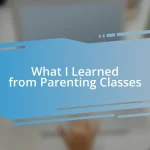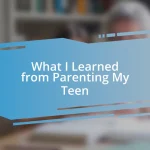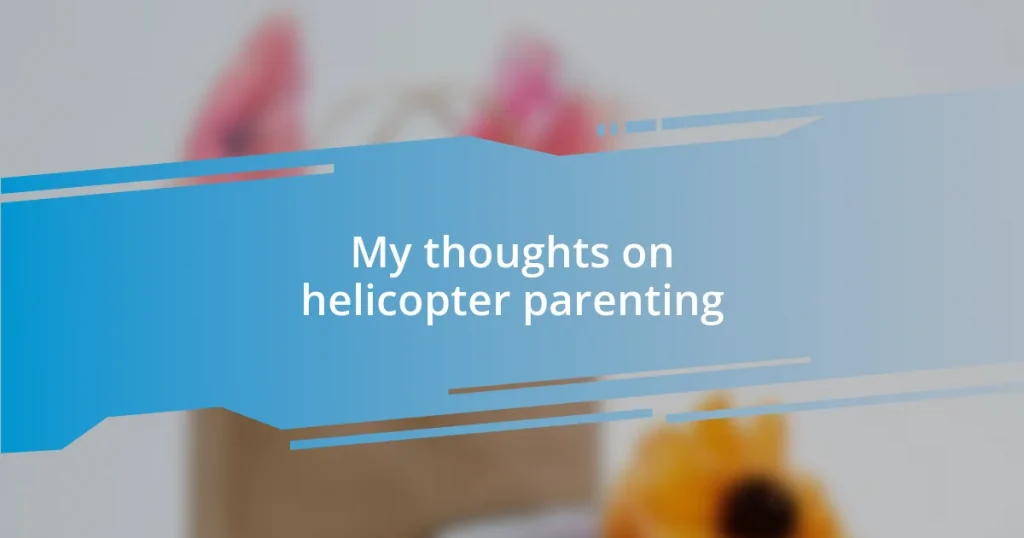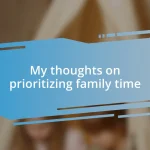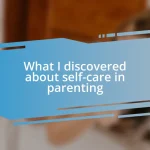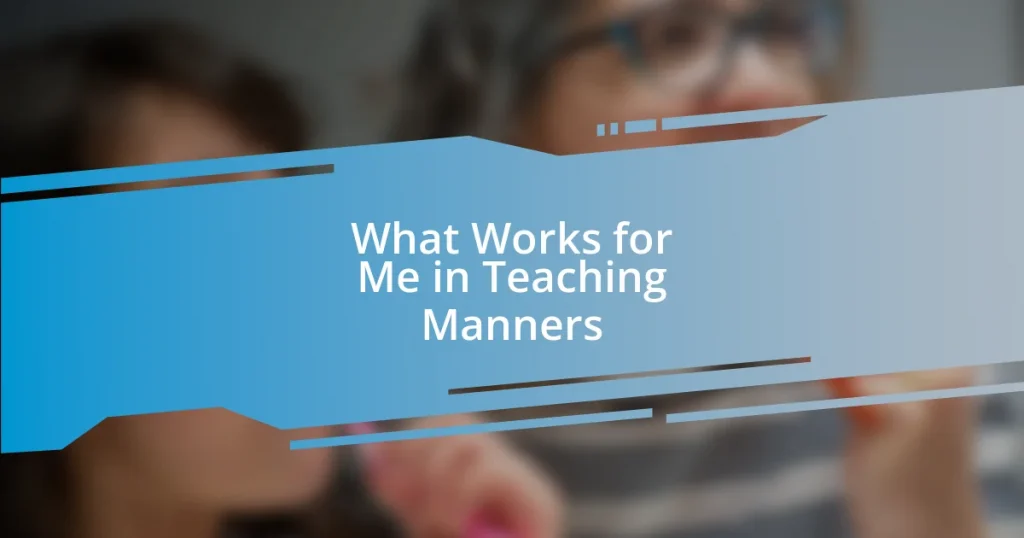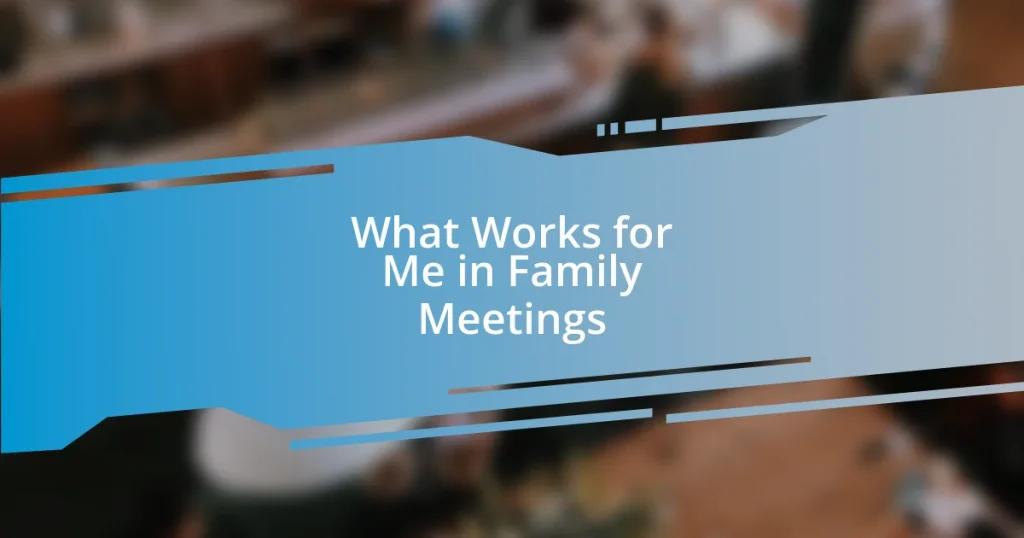Key takeaways:
- Helicopter parenting can hinder a child’s independence, resilience, and problem-solving skills by fostering dependency on parental intervention.
- Balancing guidance with space for children to learn from their mistakes promotes growth, confidence, and self-sufficiency.
- Encouraging open communication and self-directed activities allows children to explore their interests, leading to healthier emotional and social development.
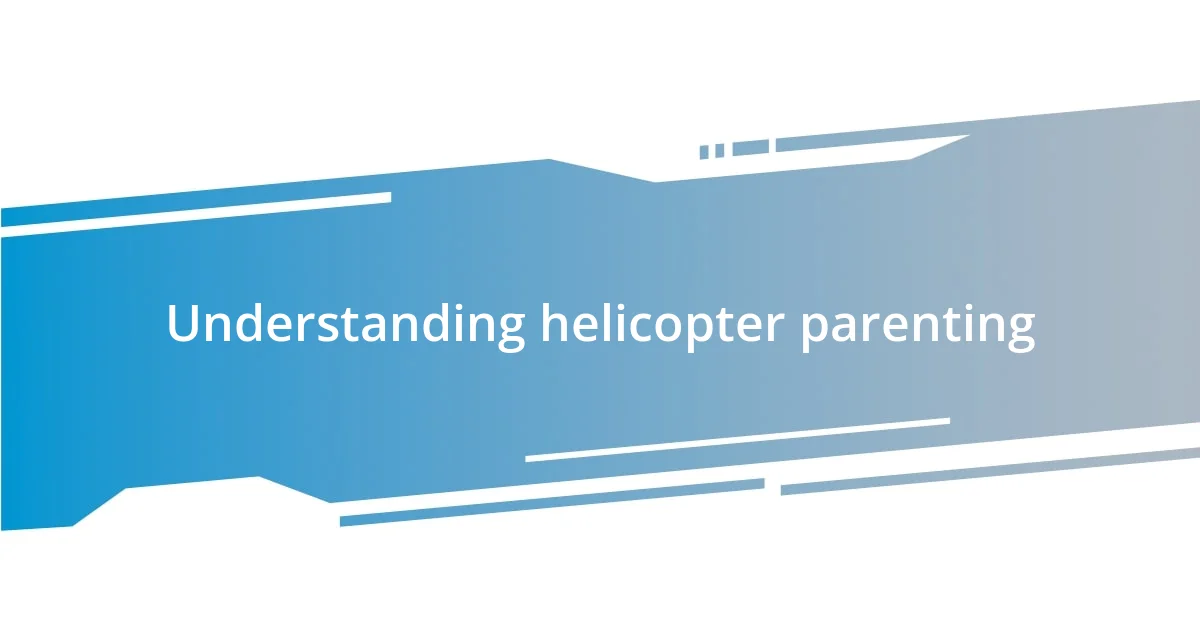
Understanding helicopter parenting
Helicopter parenting, characterized by excessive involvement in a child’s life, often stems from a place of love and concern. I remember a friend from my childhood whose mother would always hover nearby, ready to swoop in at the slightest sign of trouble. While her intentions were undoubtedly protective, I often wondered whether this created more anxiety for her than it prevented.
As I grew older, I recognized that this intense level of involvement could stifle a child’s sense of independence. Have you ever felt like you just needed to make some mistakes to learn? That’s exactly what these children often miss out on. Instead of learning resilience or problem-solving skills, they might rely on their parents to navigate every little pothole in the road.
Understanding the emotional undertones of helicopter parenting is critical. Parents may feel that their constant vigilance ensures success and safety, yet this can lead to feelings of inadequacy in their children. I often reflect on how a little space can foster growth—creating opportunities for kids to explore their own boundaries, rather than relying on their parents to dictate their paths.
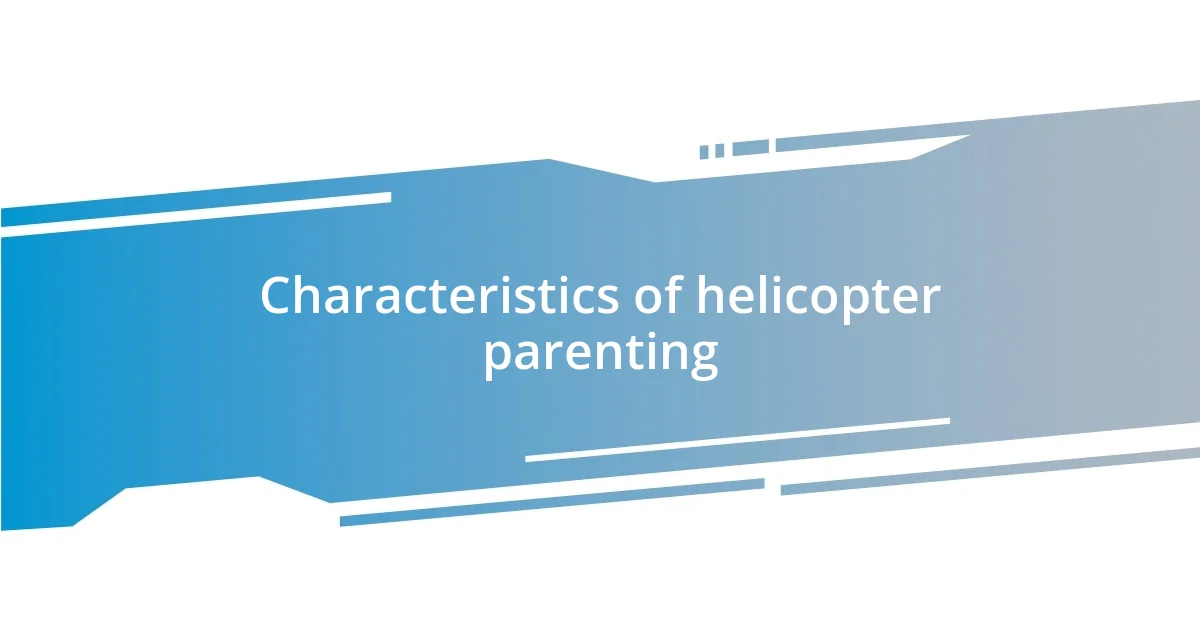
Characteristics of helicopter parenting
Helicopter parenting manifests through various defining characteristics. One notable trait is the constant oversight and involvement in a child’s daily activities, often leading to an inability to make independent decisions. In my own experience, I’ve seen parents who would not only organize playdates but also stay nearby to monitor interactions, fearing that anything less could result in conflict or sadness. This level of supervision can ultimately overshadow a child’s ability to navigate social dynamics on their own.
Another common characteristic is the tendency to intervene at the first sign of challenges or mistakes. I remember a colleague whose child faced struggles in school. Rather than allowing her son to tackle his homework or negotiate with teachers, she stepped in to handle every issue, which inadvertently conveyed the message that he wasn’t capable of advocating for himself. This approach can limit a child’s problem-solving skills, as they might not develop the tools needed to face life’s inevitable hurdles.
Additionally, helicopter parents often exhibit a profound fear of failure, believing that their interventions are essential for their child’s success. It’s akin to watching a dance performance: the parents are the stagehands, always adjusting the lights and props but never letting their child take the stage alone. This dynamic can lead to a lack of resilience in children, as they grow accustomed to constant parental support rather than learning to overcome obstacles independently.
| Characteristic | Description |
|---|---|
| Excessive Oversight | Constant involvement in the child’s daily life, leading to hindered independence. |
| Early Interventions | Intervening at the first sign of struggle, preventing children from facing challenges on their own. |
| Fear of Failure | A strong belief that without their help, children will not succeed, leading to dependency on parental support. |
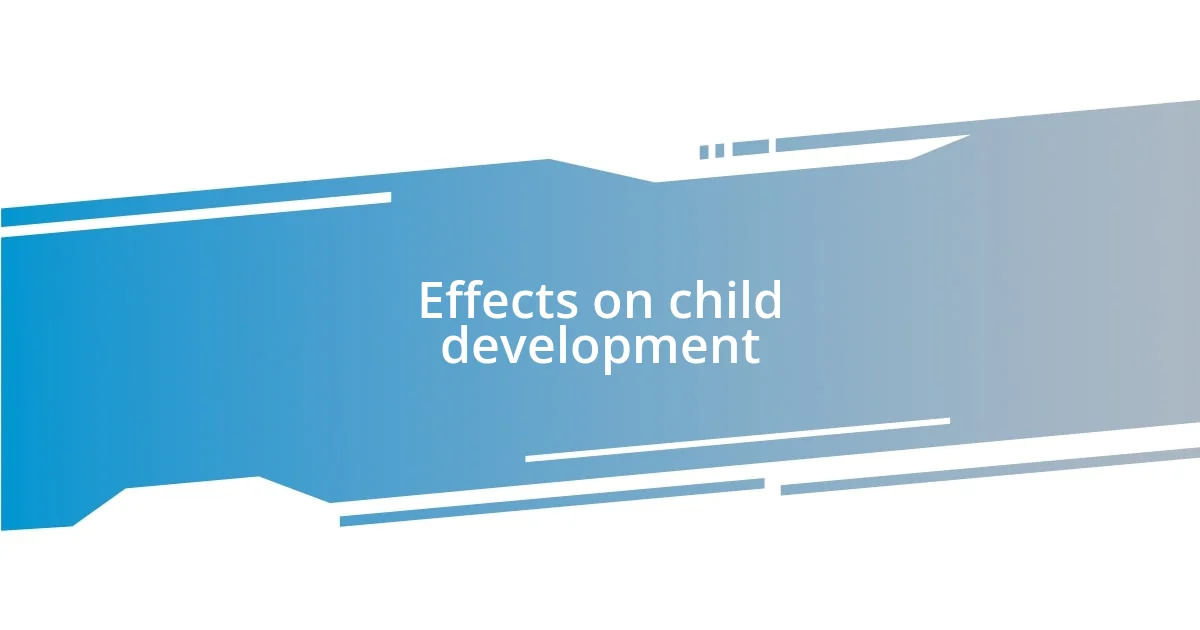
Effects on child development
The effects of helicopter parenting on child development can be profound and long-lasting. As I think back on my childhood friends, I realize how some seemed to struggle with the simplest tasks, like deciding what to wear or which book to read. Their confidence often seemed tied to their parents’ approval, and it makes me wonder how many opportunities for growth were quietly forfeited.
Here are some key effects I’ve observed on child development:
- Reduced Independence: Children may struggle to make their own choices, leading to a hesitancy in trying new things.
- Lower Resilience: By not facing challenges independently, kids can feel unprepared to handle setbacks, leaving them at a loss when faced with difficulties later in life.
- Increased Anxiety: Constant parental oversight can create a sense of pressure, leading to anxiety about performance and fear of failure.
- Weakened Social Skills: Without the chance to navigate friendships and conflicts on their own, children may find it hard to build relationships effectively.
Personally, I remember a high school classmate who experienced this firsthand. Despite being exceptionally bright, her reluctance to speak up in class or voice her opinions highlighted a deep-rooted fear of making mistakes. It was as if her parents’ constant reassurance stifled her voice instead of strengthening it. This taught me that while parents often have the best intentions, their approach can inadvertently dissolve the qualities that foster a child’s growth and independence.
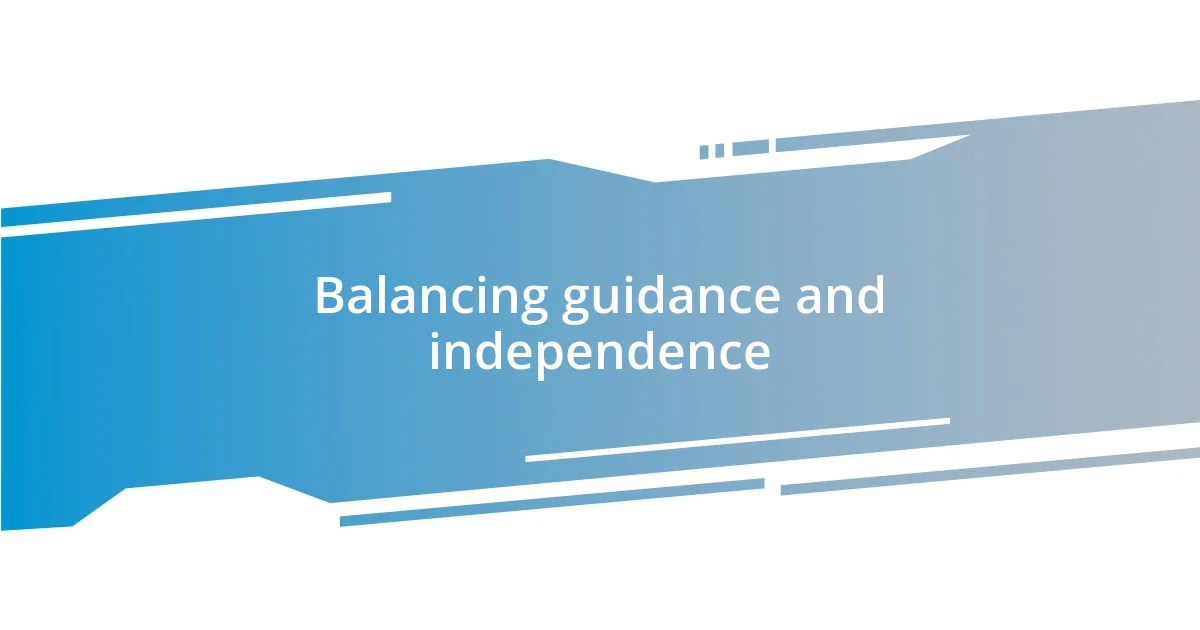
Balancing guidance and independence
Finding the right balance between guiding children and allowing them the space to grow independently is a tightrope walk for many parents. I recall a time when I wanted to help my younger sibling with a challenging puzzle. Instead of jumping in and solving it for them, I stepped back and asked questions, nudging him to think aloud. This small shift empowered him to discover solutions on his own and become more confident in facing tasks, a lesson that often stays relevant in life’s broader challenges.
Independence is a critical skill, and I’ve seen firsthand how it can be stifled by over-involvement. I remember a friend who relied heavily on their parents for every decision, even choosing a dinner location. Whenever I suggested they make a choice without consulting their parents first, they felt overwhelmed. It’s interesting how liberation from continuous parental input can ignite critical thinking and problem-solving skills. What if children had the freedom to decide, even if occasionally they stumbled? These missteps could serve as valuable learning experiences, building resilience in the process.
In navigating this balance, parents might ponder how to offer support while also stepping back to let their children make mistakes. Reflecting on my own experiences, I realize that it’s often in those moments of challenge, when we feel lost, where growth occurs—like the first time I tackled a difficult subject in school without my parents’ help. The thrill of overcoming that hurdle is an example worth sharing, setting the groundwork for independence that lasts a lifetime.
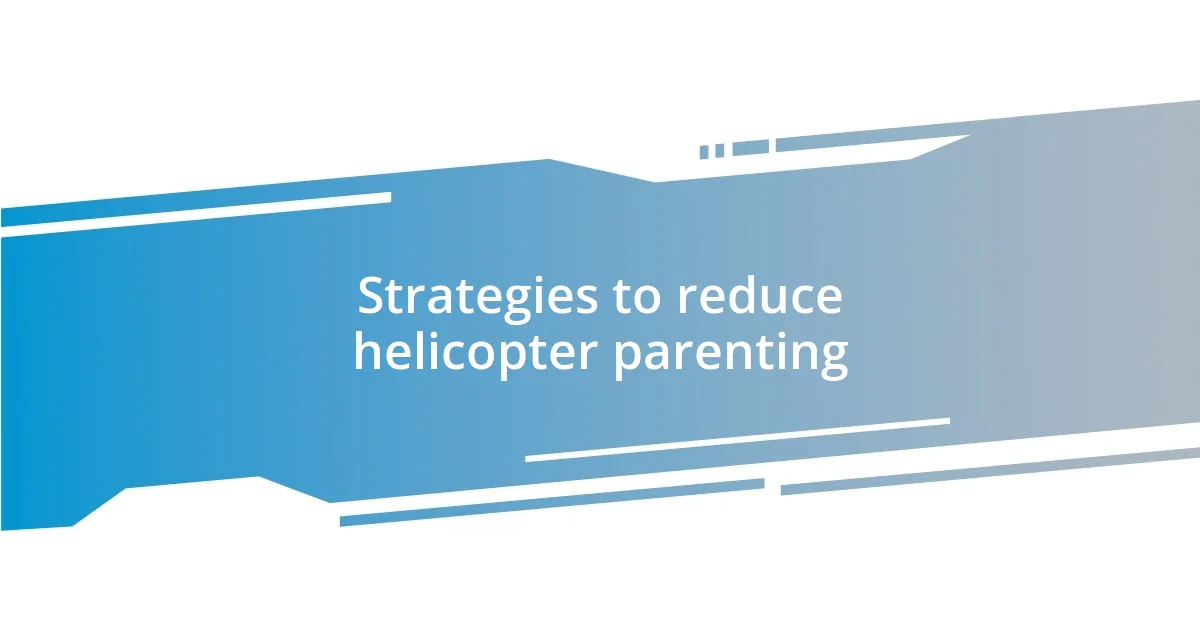
Strategies to reduce helicopter parenting
One effective strategy to reduce helicopter parenting is to embrace the art of letting go. I vividly remember the first time I allowed my daughter to walk home from school alone. My heart raced as she strolled off, but I gave myself a pep talk about trusting her instincts. She returned with a beaming smile, excitedly sharing her adventure. That moment reminded me that giving kids the chance to navigate their world independently can build not only their confidence but also mine as a parent.
Another approach involves setting small goals that encourage independence. I used to micromanage my son’s homework, hovering over him instead of fostering his own autonomy. Eventually, I decided to designate specific ‘homework hours’ during which he could work without interruptions. Watching him grasp concepts and celebrate his understanding filled me with pride. I realized that by creating those boundaries, I empowered him to take charge of his learning, making those academic challenges feel less daunting.
Additionally, engaging in open conversations about the importance of mistakes can shift the focus from control to growth. I recall having a heart-to-heart with my best friend about our parenting styles, and she shared how she learned to celebrate her kids’ failures as stepping stones. This perspective changed how I approached situations with my own children. No longer did I react to their missteps with anxiety; instead, I found joy in discussing what they learned. What if we all viewed mistakes this way? It might just transform our relationships with our kids and foster a generation of resilient thinkers who aren’t afraid to try.
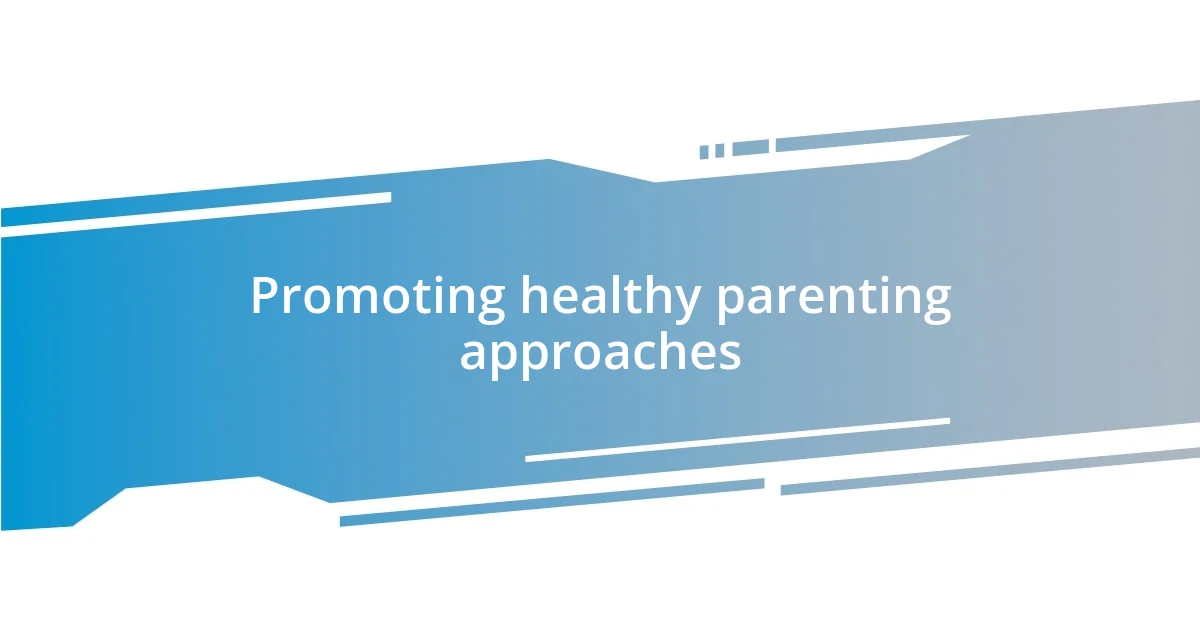
Promoting healthy parenting approaches
Promoting healthy parenting approaches involves recognizing the power of open communication. I remember the first time my child voiced their opinion about a family outing. It was a simple thing, just a request to visit the local park instead of the crowded mall. I was surprised at how much I enjoyed listening to their perspective, and it dawned on me that encouraging such discussions not only validates their feelings but also fosters a sense of agency. Isn’t it fascinating how just a few words can build bridges between parents and kids?
Another important aspect is modeling emotional resilience. I’ve had moments where my plans went awry, like when I dropped a fancy cake I had baked for a family gathering. Initially, I felt embarrassed, but I laughed it off and involved my kids in making an impromptu dessert together. I noticed how this experience turned into a lesson about embracing imperfections and viewing hiccups as opportunities to bond. Couldn’t we all benefit from recognizing that our struggles can teach our children about facing challenges with grace?
Finally, prioritizing individual interests and hobbies is vital for healthy parenting. I reflected on my childhood and how my parents encouraged me to explore various activities, from soccer to painting, which ultimately shaped who I am today. There’s so much joy in watching my children discover their passions, whether it’s through art or sports. When I allow them the space to pursue what truly excites them, I see their creativity and confidence flourish. Isn’t it rewarding to think that the best gift we can give our children is the freedom to discover who they are?
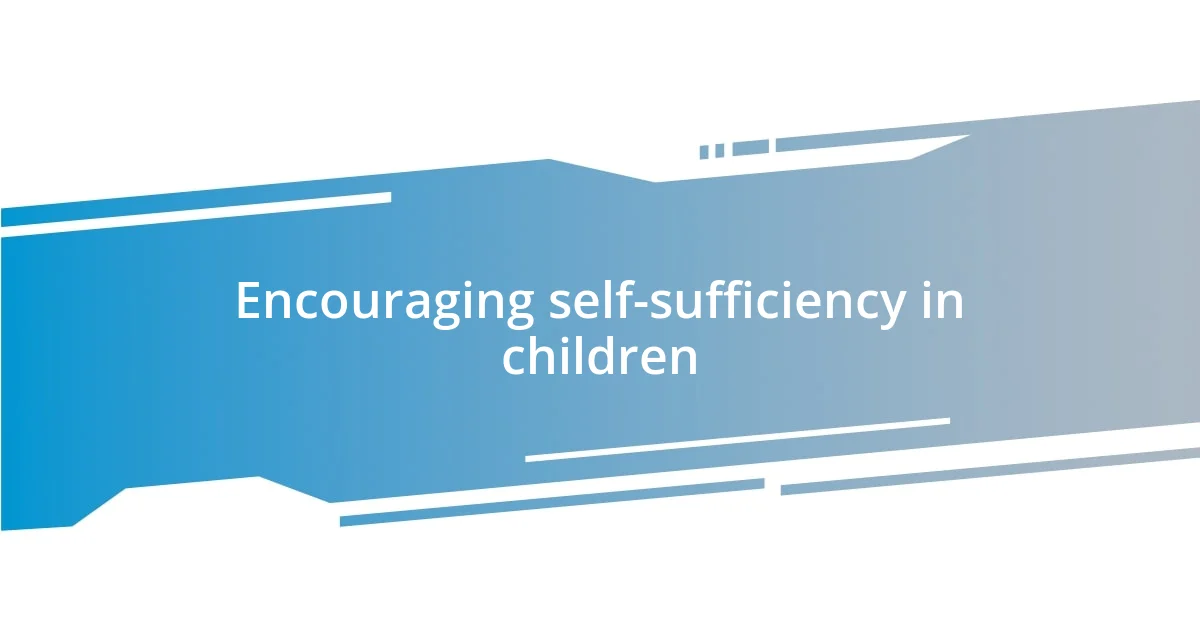
Encouraging self-sufficiency in children
Nurturing self-sufficiency in children often starts with simple tasks that promote independence. I remember when I first handed my daughter a broom and asked her to help with the cleaning. At first, I felt the urge to jump in and correct her technique, but I held back. Watching her tackle the job her way, with a few playful spins and some giggles, I realized that allowing her to handle tasks on her own can cultivate a sense of responsibility that no lecture ever could. Isn’t it incredible how these little acts can spark a desire to take charge?
Another powerful method is encouraging decision-making skills in daily life. One afternoon, I let my son choose his outfit for the day instead of picking for him, and he surprised me with a combination I would never have thought of. The joy on his face as he confidently walked out the door was a lightbulb moment for me. I began to see that each choice, however small, was an opportunity for him to learn about his own preferences and the consequences of those choices. Isn’t it heartwarming to witness our kids blossoming into their unique selves?
Finally, building resilience is a key element in fostering self-sufficiency. I recently let my son plan his own birthday party, from the guest list to the theme. As the event approached, I felt a mix of pride and anxiety about what might go wrong. Yet, when party day arrived, everything unfolded in a way only kids can orchestrate—some last-minute chaos that turned into belly laughs. It was a beautiful reminder that, while I worried about perfection, my son was learning invaluable lessons about planning, problem-solving, and adaptability. How can we not celebrate these moments of growth when they blossom right before our eyes?








